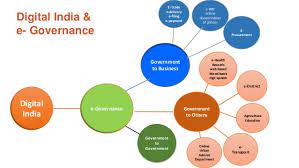
‘Good governance’ is central to the achievement of the Sustainable Development Goals (SDGs) which can best be achieved through prudent use of e-governance. Application of digital technologies (information and communication technologies -ICTs) in the processes of governance is termed as ‘e-governance’ which is indeed a meaningful contrivance for accelerating governance towards good governance. It was actually in the late '90s that the governance embraced digital technologies for dissemination of public services and information. Now- mid-2000 onwards, these technologies have also been accepted as a norm for co-creating values in governance. This opportune acceptance of technology in governance practices has helped to overcome biased instances of informal decision making and has also helped to surmount governance ills too. In our country, Digital India has already put the nation-state on the path of being ‘paperless’, ‘faceless’ and ‘cashless’ and now this has been coupled with an urgent need of being ‘contact-less’ too. This training has been designed for all those who would like to fathom various building blocks of this broad multidisciplinary landscape of e- governance, and also trace the journey of India from the erstwhile times of railway computerization of pre 1990s till Digital India and Covid time digital initiatives of government now. Let us learn all this from the scratch.
Objectives of the course
After the completion of the training, the learners shall be able to:-
Number of Days : 5
Target Audience : All Probationers
Description on Modules
Module-1 Fundamentals of e-Governance: Good Governance, SDGs and Role of ICT, Gartner’s Maturity Model of e-Governance, e-government to e-governance, Digital transformation from Digitisation to Digitalisation, Portals to Platforms; UN’s e-Govt Development Index (eGDI) , e-Participation Index (ePI), Emerging Technologies.
Module-2 : e-Governance Project Management: e-Governance Life Cycle, Request for Proposal-RFP, Detailed Project Report for e-Governance projects (DPR), and PPP models (BOO/ BOOT).
Module-3 : Evolution of e-Governance from railway computerization till Digital India:
Module -4 Challenges and Way Forward:
Pedagogy: The basic attempt would be to imbue the basics from the pre-reads ( subjected to resource constraints) and then coverage in the classroom for learning together to apply, discuss and debate with our invited GovTech leaders and intelligentsia as well as with each-other.
Why is the training unique?
This training on e-governance shall attempt to introduce these three major constituents of e-governance from three different perspectives - firstly through the lens of a technocrat, then of a bureaucrat and finally from the perspective of a social scientist. It finally culminates to synergize these three perspectives so that our learners could comprehend this domain more holistically.